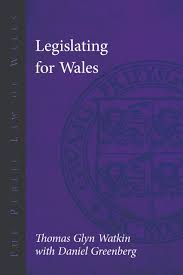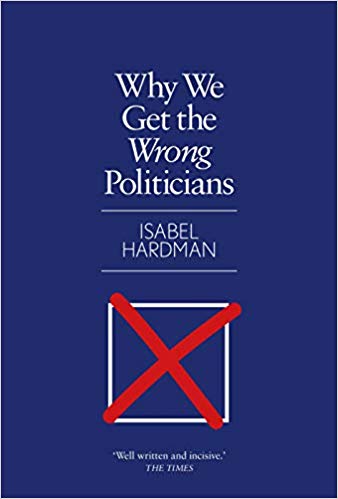
The year 2018 saw publication of notable books in the parliamentary circles. In this post, I share with you the ones that I came across. If you know of more, please let me know in the comments section.
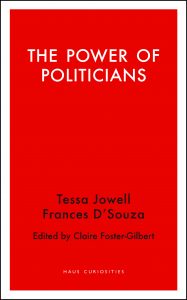
This book, published with the Westminster Abbey Institute, won in the Parliamentary Book Awards 2018 in the Best Memoir by a Parliamentarian category.
“The Power of Politicians is an account of Tessa Jowell’s experience of entering politics and making effective sense of her role. Here, with Frances D’Souza, she gives fascinating insights into the workings of Parliament, the successful development of policy into legislation and also interior life: how she protected herself against the morally corrosive force of power-seeking, what inspired her and what troubled her. The result is a masterclass in how to be a good politician. The Power of Politicians not only offers a case study of the life and work of a politician, but also attends to deeper questions about what is morally and emotionally demanded of our political class — exposed as they are to the corrosive effects of having to seek and retain power — and of the institution of Parliament itself, in the face of public hostility and indifference.”
#2 Confessions of Recovering MP by Nick de Bois
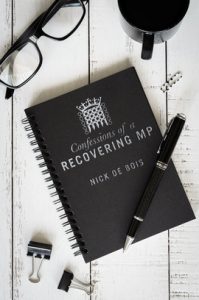
“You are not an executive who can make and enforce decisions. You are a legislator who votes on making laws.
You are not a counsellor, a housing officer, benefits clerk, bank or trading standards officer, but you are often expected to provide a new home, sort out benefits, provide a loan or settle a dispute about a computer game bought for little Jimmy that doesn’t work.
You are, in fact, a 21st century Member of Parliament representing about 125,000 good folk from your constituency by taking your seat in probably the finest parliament in the world (despite what you may read or hear in the media).
You are elected by a simple majority from roughly 50,000 people who mark their ‘X’ by your name at a general election, hoping that you will be able to make a difference somehow.
Then, when as a new MP, you walk through the Members Lobby filled with a vision of how you will leave your mark on this place and this nation, what you are almost certainly unaware of is that your constituents, your government, the press and the very institution of the Palace of Westminster have other plans for you.
So it was for Nick de Bois in May 2010 when, with an unimpressive and insecure majority of 1,682, he began the journey of a life time, meeting head-on the bizarre, the inexplicable, the touching, the shocking, the vitally important and, thank god, lots of utter nonsense as well.”
This book, published with the Biteback Publishing, was shortlisted in the Parliamentary Book Awards 2018 in the Best Memoir by a Parliamentarian category.
# 3 Confessions of a Political Maverick by Austin Mitchell
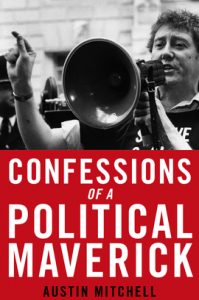
“Austin Mitchell is one of the original political mavericks. For thirty-eight years he was a fly in the parliamentary ointment, a recurring itch on the body politic: annoying the whips, threatening party discipline and challenging the solemnities of Parliament.
A career-long backbencher, Mitchell found he relished being in opposition. Dissenting from the peculiar conformity of career politicians climbing the greasy pole may have been a lonely job, but someone had to do it – and it was also a lot of fun. Here, he tells the story of how he waltzed into a seat in Labour’s heartlands, outlines his views on the controversial European question and explains his long (and torrid) love affair with the Labour Party.
Brimming with revealing details of his dealings with all the major political players from Thatcher to Cameron, and enlivened by hilarious anecdotes and a real fondness for his time in Grimsby, these are the political memoirs of a true parliamentary rebel – with a cause.”
This book, published with the Biteback Publishing, was shortlisted in the Parliamentary Book Awards 2018 in the Best Memoir by a Parliamentarian category.
#4 Why we Get the Wrong Politicians by Isabel Hardman
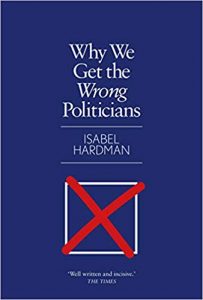
“Politicians are consistently voted the least trusted professional group by the UK public. They’ve recently become embroiled in scandals concerning sexual harassment and expenses. Every year, they introduce new legislation that doesn’t do what it sets out to achieve – often with terrible financial and human costs. But, with some notable exceptions, they are decent, hard-working people, doing a hugely difficult and demanding job.
In this searching examination of our political class, award-winning journalist Isabel Hardman tries to square this circle. She lifts the lid on the strange world of Westminster and asks why we end up with representatives with whom we are so unhappy. Filled with forensic analysis and revealing reportage, this landmark and accessible book is a must read for anyone who wants to see a future with better government.”
A Guardian review praises the book.
This is a really good book. Well-structured and well-written, it marshals well-selected statistics and combines them with human stories to cast valuable illumination on how politicians really spend their, often frustrating and miserable, time. The author makes some useful suggestions about how we might get more effective MPs without pretending that she has a magic cure. If Isabel Hardman does not have all the answers to what’s wrong with our political culture, she certainly asks the right questions.
# 5 Legal and Legislative Drafting, 2nd Edition, by J. Paul Salembier
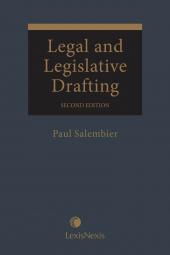
“Drafting complex legal and legislative documents can be challenging. From the organization of complex ideas to ensuring clear and unambiguous language, legal and legislative drafting is an onerous task. Mistakes can be costly – even catastrophic -for lawyers who face malpractice claims if drafting errors cost their clients money. Those charged with drafting legislative or legal documents need a solution to help them navigate through these challenges.
The Second Edition tackles this challenge – the book goes far beyond simply discussing the applicable principles; it provides readers with a step-by-step guide that helps them put those principles into action.”
J. Paul Salembier, B.Sc., LL.B., LL.M., is a former General Counsel with the Canadian Department of Justice, with more than three decades in government, largely spent drafting and developing regulations and statutes. He has also taught regulatory law and statutory interpretation, and currently teaches legislative drafting at Queen’s University Faculty of Law. He has also authored Regulatory Law and Practice, 2nd Edition (LexisNexis 2015) and has written articles on regulatory law, legislative drafting and statutory interpretation.
#6 Parliament: Legislation and Accountability edited by Alexander Horne and Andrew Le Sueur
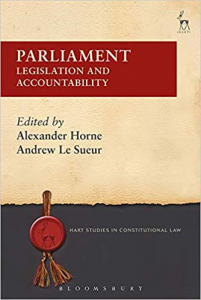
“This collection of essays by leading academics, parliamentarians and parliamentary officials provides a critical assessment of the UK Parliament’s two main constitutional roles – as a legislature and as the preeminent institution for calling government to account.
Both functions are undergoing change and facing new challenges. Part 1 (legislation) includes chapters on Parliament’s emerging responsibilities for pre-legislative scrutiny of government bills and for evaluating proposed legislation against explicit constitutional standards.
The impact on legislation of the European Union, devolution in Scotland and the growing influence of the House of Lords are also examined. Part 2 (accountability) investigates how Parliament operates to scrutinise areas of executive action previously often shielded from effective parliamentary oversight, including: national security, war-making powers, European Union decision-making, and administrative justice.
There are also chapters on parliamentary reform, including analysis of the House of Commons ‘Wright reforms’ and the regulation of lobbyists.
The book will be of interest to anyone who is curious about how the law interacts with Parliament and is aimed at legal academics, practitioners and political scientists.”
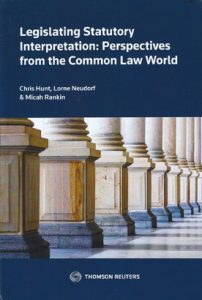
“Legislating Statutory Interpretation: Perspectives from the Common Law World is a collection of essays focusing on the relationship between interpretation acts and statutory interpretation.
The activity of interpreting statutes is often thought to be quintessentially judicial and is largely governed by common law rules and principles of statutory interpretation. Interestingly, however, in every province in Canada (and in many other jurisdictions), parliaments and legislatures have enacted statutes that purport to dictate to courts how they should interpret legislation.
For instance, section 8 of the British Columbia Interpretation Act states that “Every enactment must be construed as being remedial, and must be given such fair, large and liberal construction and interpretation as best ensures the attainment of its objects.”
What is the significance of these attempts by legislatures to direct courts to adopt a particular interpretive method, and one that is, moreover, essentially teleological in its orientation? From the standpoint of legal and constitutional theory, this incursion by parliament into this sacrosanct realm of the judiciary seems deeply problematic.
Yet the truth of the matter is that courts have largely ignored these interpretation acts and applied a common-law interpretive methodology. With the help of leading legal scholars drawn from all over the Commonwealth, this text explores the relationship between courts and legislatures in establishing methodologies for statutory interpretation. Is this relationship constitutionally permissible? And if so, is it desirable? This collection of essays will explore these questions.”
#8 Legislating for Wales by Thomas Glyn Watkin, Daniel Greenberg
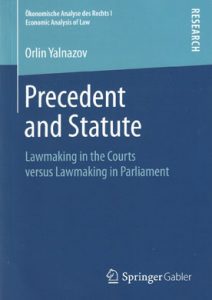
“Should laws be made in courts or in parliaments? Orlin Yalnazov proposes a new approach to the problem. He conceptualizes law as an information product, and law-making as an exercise in production. Law-making has inputs and outputs, and technology is used to transform one into the other.
Law may, depending on input and technology, take on different forms: it can be vague or it can be certain. The `technologies’ between which we may choose are precedent and statute. Differences between the two being sizeable, our choice has significant repercussions for the cost of the input and the form of the output.
The author applies this framework to several problems, including the comparison between the common and the civil law, comparative civil procedure, and EU law. Perhaps most critically, he offers a critique of the `efficiency of the common law’ hypothesis.”
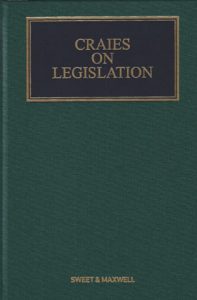
“As the pace of legislative change at all levels continues to accelerate, it becomes increasingly difficult for practitioners to know how to follow and apply, and sometimes influence or challenge, the legislation that is relevant to their clients in every area of the law.
A highly practical resource, Craies provides clear and concise answers to the most common questions users of legislation have. It aims to be an essential everyday guide covering primary legislation, subordinate legislation and devolved legislation, as well as EU legislation. Craies is relied upon by practitioners in all fields, and is regularly cited in the higher courts.”
You can listen to this post below:
–
ayes & nays

